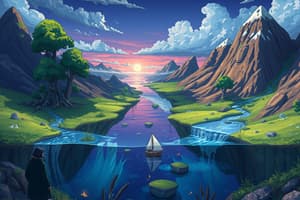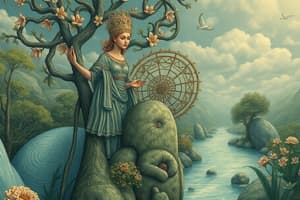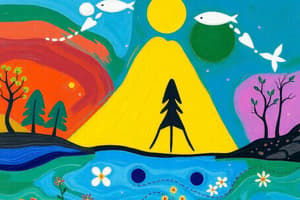Podcast
Questions and Answers
What is the process where carbon goes through the atmosphere?
What is the process where carbon goes through the atmosphere?
- Water Cycle
- Carbon Cycle (correct)
- Nitrogen Cycle
- Oxygen Cycle
What does the Water Cycle entail?
What does the Water Cycle entail?
- The process where animals breathe out carbon dioxide
- Movement of nitrogen in ecosystems
- A cycle of oxygen release by plants
- Transportation of water through the earth, atmosphere, oceans, and land (correct)
What is the main characteristic of the Nitrogen Cycle?
What is the main characteristic of the Nitrogen Cycle?
A natural cycle in which nitrogen is converted into different chemical forms
What is the function of the Oxygen Cycle?
What is the function of the Oxygen Cycle?
What does the Phosphorous Cycle describe?
What does the Phosphorous Cycle describe?
What gas makes up 21% of the atmosphere?
What gas makes up 21% of the atmosphere?
Describe photosynthesis.
Describe photosynthesis.
What happens during breathing?
What happens during breathing?
What is cellular respiration?
What is cellular respiration?
What is decomposition?
What is decomposition?
What does rusting involve?
What does rusting involve?
What is combustion?
What is combustion?
What occurs during evaporation?
What occurs during evaporation?
What happens during freezing?
What happens during freezing?
What is melting?
What is melting?
What is runoff?
What is runoff?
What is precipitation?
What is precipitation?
What is evapotranspiration?
What is evapotranspiration?
What does infiltration refer to?
What does infiltration refer to?
What is phosphorus in the context of elements?
What is phosphorus in the context of elements?
What is a fertilizer?
What is a fertilizer?
Define nutrient.
Define nutrient.
What is adsorption?
What is adsorption?
What is desorption?
What is desorption?
What is mineralization?
What is mineralization?
Define oxidation.
Define oxidation.
What is carbon's role in living things?
What is carbon's role in living things?
What is carbon dioxide?
What is carbon dioxide?
What are fossil fuels?
What are fossil fuels?
What is a greenhouse gas?
What is a greenhouse gas?
What is nitrogen's significance in the atmosphere?
What is nitrogen's significance in the atmosphere?
What is nitrogen fixation?
What is nitrogen fixation?
Flashcards are hidden until you start studying
Study Notes
Carbon Cycle
- Involves the movement of carbon through the atmosphere and its incorporation into living organisms.
- Plays a critical role in regulating Earth's climate and supporting life.
Water Cycle
- Describes the continuous movement of water on, above, and below the Earth's surface.
- Includes stages like evaporation, condensation, precipitation, and runoff.
Nitrogen Cycle
- Natural process transforming nitrogen into different chemical forms like ammonia and nitrates.
- Essential for plant growth, contributing to soil fertility.
Oxygen Cycle
- Oxygen is produced by plants through photosynthesis and consumed by animals during respiration.
- Maintains the balance of oxygen in the atmosphere.
Phosphorus Cycle
- Explains the movement of phosphorus within the environment, particularly in soil and aquatic systems.
- Important for plant growth and energy transfer in cells.
Oxygen
- Comprises about 21% of the Earth's atmosphere.
- Vital for respiration in aerobic organisms.
Photosynthesis
- A process where plants convert carbon dioxide and sunlight into glucose and oxygen.
- Fundamental for energy production in most ecosystems.
Breathing
- Involves the intake of oxygen by organisms to support metabolic processes.
- Essential for survival in most living beings.
Cellular Respiration
- Process where organisms convert glucose and oxygen into energy, producing water and carbon dioxide.
- Critical for energy release necessary for biological functions.
Decomposition
- Involves the breakdown of dead organisms into organic materials by decomposers.
- Plays a key role in nutrient cycling and soil fertility.
Atmosphere
- A mixture of gases enveloping Earth, providing essential elements for life.
- Protects living organisms from harmful solar radiation.
Rusting
- A chemical reaction where iron reacts with oxygen to form rust (iron oxide).
- Demonstrates the effects of oxidation on metals.
Combustion
- A chemical process that involves burning substances in the presence of oxygen.
- Releases energy along with carbon dioxide and other products.
Evaporation
- Process where water transitions from liquid to vapor.
- Contributes to the water cycle, affecting weather patterns.
Freezing
- The transformation of water from a liquid to solid state (ice).
- Critical for ecological dynamics in cold climates.
Melting
- Process of ice converting back into liquid water.
- Plays a role in seasonal changes and water availability.
Runoff
- Occurs when precipitation flows over land surfaces into water bodies.
- Can affect water quality and ecosystem health.
Precipitation
- Water falling to Earth in various forms, including rain, snow, sleet, and hail.
- An essential component of the water cycle.
Evapotranspiration
- The combined process of evaporation and plant transpiration.
- Important in regulating water supply and climate.
Infiltration
- Process by which water permeates through soil and porous materials.
- Affects groundwater recharge and soil moisture levels.
Phosphorus
- Non-metal element crucial for biological processes, with an atomic number of 15.
- Key component of DNA, RNA, and ATP, influencing energy transfer.
Fertilizer
- Chemical or organic substances added to soil to enhance nutrient availability.
- Boosts plant growth and agricultural productivity.
Nutrient
- Essential substances that provide nourishment to organisms.
- Include macro and micronutrients necessary for various physiological functions.
Adsorption
- Process where inorganic phosphorus chemically binds to soil particles.
- Contributes to phosphorus availability for plant uptake.
Desorption
- Release of adsorbed phosphorus back into the soil solution.
- Affects the dynamics of nutrient availability in soils.
Mineralization
- Breakdown of organic matter by bacteria into simpler inorganic forms.
- Converts organic nutrients into accessible forms for plants.
Oxidation
- Chemical process involving the loss of electrons, often associated with oxygen.
- Fundamental in various biological and chemical reactions.
Carbon
- Essential element forming the basis of all known life.
- Found in proteins, lipids, carbohydrates, and nucleic acids.
Carbon Dioxide
- A gas produced by respiration and combustion, significant for photosynthesis.
- Acts as a greenhouse gas contributing to climate change.
Fossil Fuels
- Natural fuels formed from the remains of ancient organisms.
- Release carbon dioxide when burned, impacting the carbon cycle.
Greenhouse Gas
- Gases that trap heat in the atmosphere, including carbon dioxide and methane.
- Contributes to global warming and climate change.
Nitrogen
- Makes up approximately 78% of the Earth's atmosphere.
- Essential for protein synthesis and nucleic acid formation.
Nitrogen Fixation
- Process converting atmospheric nitrogen into ammonia or related compounds.
- Essential for soil health and plant growth, enhancing nutrient availability.
Studying That Suits You
Use AI to generate personalized quizzes and flashcards to suit your learning preferences.




